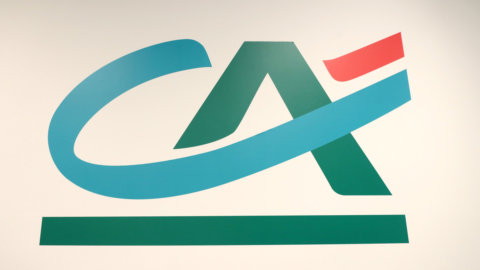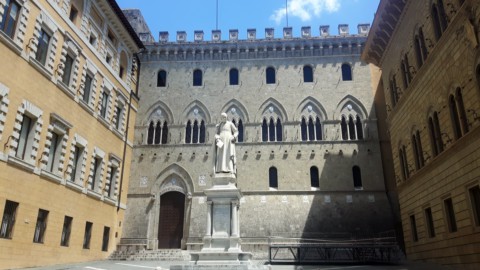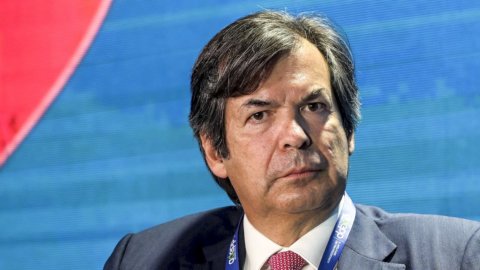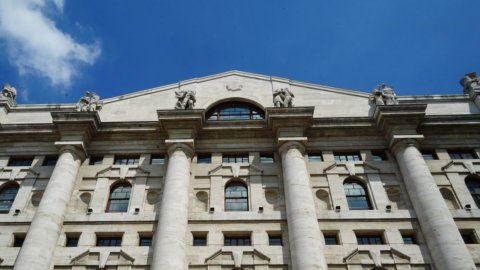OBAMA: 447 BILLION OF STIMULATIONS TO THE ECONOMY INCLUDING 240 BILLION RELIEF TO COMPANIES
"The problem is to understand if, in the face of a national crisis, we are able to stop the political circus and really do something to save the economy". With these words, in the face of Democrats and Republicans ("with stony faces" notes the New York Times) Barack Obama launched his 447 billion dollar stimulus plan for the economy, through tax cuts, for 70 percent , and public investment for the rest. The most significant part of the project concerns the cuts in contributions paid to the state by companies (240 billion), while 140 billion will be allocated to the construction of schools, roads and other public works. The plan, which follows the lines of the previous 787 billion package launched by Obama in 2009, at the beginning of his mandate, is more substantial than expected. And it was received, surprisingly, with some interest by the Republicans. “Some ideas – said the Speaker of the House of Representatives, John Boehme – deserve to be examined carefully. I hope the president does the same with our suggestions."
BERNANKE DOES NOT REVEAL PAPERS WALL STREET SLOWS DOWN -1,1%
A few hours before Obama's speech (32 minutes in all), it was Ben Bernanke who addressed the issue of the employment emergency in a slowing economy speaking at the Minnesota Economics Club in Minneapolis.
The Fed, said the central banker, will examine all the tools that can accelerate the recovery and will evaluate their use during the next meeting. But it hasn't made specific commitments, as Wall Street had hoped after the negative employment data. There was therefore no mention of the most probable move being examined by the next FOMC meeting on 20 September: the "Twist operation", i.e. the sale of short-term securities and the simultaneous purchase of long-term bonds for lengthen the "duration" of the portfolio and flatten the curve by lowering long-term rates. Bernanke, however, specified that "there are no signs that the growth in inflation has been incorporated into the economy", responding indirectly to those who in recent weeks had highlighted that new measures by the central bank could revive the price dynamics. Inflation is pushed up by temporary factors "and will slow down in the coming quarters".
The market response to Bernanke has not been enthusiastic. Standard & Poor's, immediately after the Fed chairman's speech, lost 0,9% to 1.188,83 points and then worsened to -1,06%. Same trend for Dow Jones Industrials (-1,04%) and Nasdaq (-0,78%). Only today will there be the reaction of the US markets to Obama who spoke in the evening.
ASIAN PRICE LISTS IN THE BALANCE. TOKYO -0,5%
CHINA CELEBRATES THE HOLDING OF PRICES
First contrasting reactions of Asian price lists to Obama's speech on employment. The MSCI Asia Pacific records a drop of 0,2%, Tokyo is down by 0,5% also due to disappointing data on the recovery after the earthquake.
Conversely, the Shanghai Stock Exchange rallied 3,3% on news that inflation, after peaking at 6,5% last month, fell to 6,2%. The change should at least allow the central bank to interrupt the long series of interventions on interest rates and loans, five in all, which weighed on the fate of the stock market.
THE ECB LAUNCHES THE STAGNATION ALARM
TRICHET APPROVES THE ITALIAN MANEUVER
The European economy slows down. Rates do not go up, also because inflation is less scary. Italy promoted with reserve. No comments on future purchases of the Central Bank on the secondary market of BTPs and Bonos. Here is, in summary, the press conference of ECB President Jean-Claude Trichet who, with regard to Italy, said that despite some initial "complexity" and "hesitations" he is moving in the right direction with respect to what the ECB has indicated . Trichet also glossed over central bank debt support and the continuation of BTP purchase programmes. Previously, however, the ECB president stated "that all support measures are to be considered temporary".
In the euro area, "uncertainty is particularly high" and "risks prevail" on growth. "We are going through the worst crisis since the Second World War." It is therefore "fundamental" that the fiscal consolidation measures announced by European governments be "anticipated" as much as possible and "completely put into practice": this is Trichet's warning. "Uncertainty is particularly high" for the economies of the euro area. And the risks have intensified », he said at the opening of the conference. Growth will be "modest" and lower than expectations, being affected by the global slowdown in the second half of the year. But it also curbs inflation: rates, therefore, do not increase.
BUSINESS PLACE (+0,70%)
IT IS THE BEST STOCK EXCHANGE BANKS AND ENERGY DRIVE THE RECOVERY
The growth alarm triggered, as a reaction, a flurry of sell-offs on the markets, which then subsided. In closing, the Milan Stock Exchange is the best of the European markets, supported by the good recovery of oil companies and some banks. The FtseMib index rose by 0,69%. London advanced by 0,29%, Paris +0,39%, Frankfurt unchanged.
Meanwhile, the yield of the ten-year BTP has interrupted the descent of the last two days and has risen to 5,24%. The spread with the German Bund has recovered to 340 points.
The best performing stocks in Europe were oil, with the Stoxx index for the sector up 2,1%. WTI crude is trading at $89,4 a barrel (unchanged). Among the protagonists of the Milanese list, Eni stood out, gaining 2%, Saipem advanced by 2%. France's Total rose 2,4%.
In Piazza Affari, the increases were led by Stmicroelectronics (+2,57% to 4,392 euros), Mediolanum (+2,47% to 2,486 euros) and Enel Green Power (+2,12% to 1,639 euros).
Bank stocks, on the other hand, reduced the rises in the morning. The best is Mps with a +0,91% to 0,398 euro, followed by Intesa Sanpaolo (+0,87% to 1,044 euro) and Banca Popolare di Milano (+0,83% to 1,331 euro).
Telecom Italia rose moderately (+0,44% to 0,806 euro) despite Moody's review of the outlook from stable to negative.
Among the minuses, that of Mediaset stands out (-1,67% to 2,48 euros), affected by a downgrade by Mediobanca.
Among the mid caps, Astaldi and Fiera Milano closed up by 4,5%.
HOW MUCH DOES IT COST TO ABANDON THE SINGLE MNETA?
10 THOUSAND EUROS PER CAPITA IMMEDIATELY, SAYS UBS. THEN THE DRAMA
Exiting the euro would involve dramatic costs. It is the result of a Ubs study which outlines a dramatic scenario in the event that such a situation should arise. Analysts believe a 20% devaluation is too optimistic, stressing that no country would take such a step to achieve such a modest adjustment in its position. Making a parallel with what has already happened in Argentina and Uruguay, UBS believes that the new national currency, be it the drachma, peso or lira, should be worth at least 50-60% less than the euro. The benefits of devaluation would be completely undone in a very short space of time. For UBS, abandoning the single currency would cause the default of government securities and that of corporate bonds in rapid succession. Debts issued in euros would remain denominated in that currency and therefore, a fortiori, there would be no adequate financial resources necessary to meet the payment of interest and the repayment of outstanding securities which have become more onerous in the meantime. The country's confidence among investors would then be definitively compromised, thus making it difficult to place new securities on international markets. The bloodletting, already in the first year, would be 10 euros per capita.





